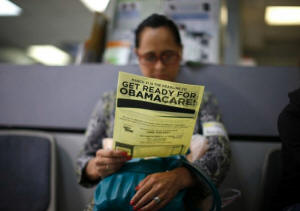|
Obama to give his diagnosis for what ails
Obamacare
 Send a link to a friend
Send a link to a friend
 [October 20, 2016]
By Roberta Rampton [October 20, 2016]
By Roberta Rampton
WASHINGTON (Reuters) - President Barack
Obama on Thursday will head to the election battleground state Florida
to give his prescription for fixing the Affordable Care Act, his
signature healthcare law, but any remedies will be left up to his
successor and the next Congress.
Battling a barrage of negative headlines about rising health insurance
premiums and shrinking doctor networks for people participating in the
program, Obama is urging more young, uninsured people to sign up for the
subsidized insurance plans offered under the law.
He also wants to encourage lawmakers to create a government-run health
insurance option to help U.S. states where there is little or no
competition among private insurers.
"That added competition in all 50 states would, we believe, have the
effect of further challenging private health insurance companies to
improve their offerings and reduce their prices," White House spokesman
Josh Earnest said on Wednesday.
Obama will speak about Obamacare in Miami before heading to a rally for
Hillary Clinton, the Democratic candidate in the Nov. 8 presidential
election, who has said she would add a public option and expand tax
incentives for healthcare costs. Republican Donald Trump has pledged to
repeal and replace the law.

The Patient Protection and Affordable Care Act was signed into law by
Obama in March 2010. It created online exchanges, which opened in 2014,
where consumers can shop for individual health insurance and receive
income-based subsidies.
Republicans who control Congress have bitterly fought the program,
saying it creates unwarranted government intervention in personal
healthcare and private industry.
The government forecasts 13.8 million people will sign up for Obamacare
plans in 2017, up 1.1 million from 2016.
There are 10.7 million uninsured people who are eligible for the
exchanges but have not enrolled, and about 40 percent of those are
young, Health and Human Services Secretary Sylvia Burwell said on
Wednesday.
Nationwide, not enough young and healthy people have signed up to
provide a revenue stream that offsets the costs of covering members with
serious illnesses.
As a result, several big insurers, including UnitedHealth Group Inc,
Aetna Inc and Humana Inc, are pulling out of the online marketplaces
selling the subsidized plans, citing bigger than expected financial
losses.
Monthly premium prices have climbed, which further discourages some
people from signing up.
[to top of second column] |

Arminda Murillo, 54, reads a leaflet on Obamacare at a health
insurance enrollment event in Cudahy, California, U.S. March 27,
2014. REUTERS/Lucy Nicholson/File Photo

"Next year will tell whether those are growing pains, or they are
more serious issues," Drew Altman, chief executive of the Kaiser
Family Foundation, said in an interview.
Analysis conducted by the nonpartisan foundation suggests at least
16 million people need to enroll before the online Obamacare
insurance marketplaces stabilize.
Obama credits the Affordable Care Act, one of his main legislative
achievements, with reducing the number of uninsured Americans from
49 million in 2010 to 29 million in 2015, according to an August
article in the Journal of the American Medical Association.
Much of the decline is due to the law's provision allowing states to
expand Medicaid health coverage for the poor.
The law also prohibited insurance companies from denying coverage to
Americans if they already had medical problems, and allowed parents
to keep children insured on their health plans until age 26.
Some health policy experts on both the political left and right say
Congress may be more receptive to bipartisan efforts to fix the
Affordable Care Act after its creator leaves office. Some Republican
governors who refused to expand Medicaid may also be more willing to
do so after the election.
"I think the piece of Obamacare that people don't like is Obama,"
Kathleen Sebelius, Obama's former Health and Human Services
secretary who oversaw the program's launch, said in an interview.
"This has become a very personal battle about this president, which
is I think really unfortunate."
(Additional reporting by Caroline Humer in New York; Editing by
Matthew Lewis)
[© 2016 Thomson Reuters. All rights
reserved.]
Copyright 2016 Reuters. All rights reserved. This material may not be published,
broadcast, rewritten or redistributed.
 |